In this article:
Tears have been given a bad rep by all of us, but little do we know how necessary they are for the health of our eyes. Dry eyes, also known as dry eye syndrome, occurs when your tears are not providing enough lubrication to your eyes. This can be associated with a lot of discomfort.
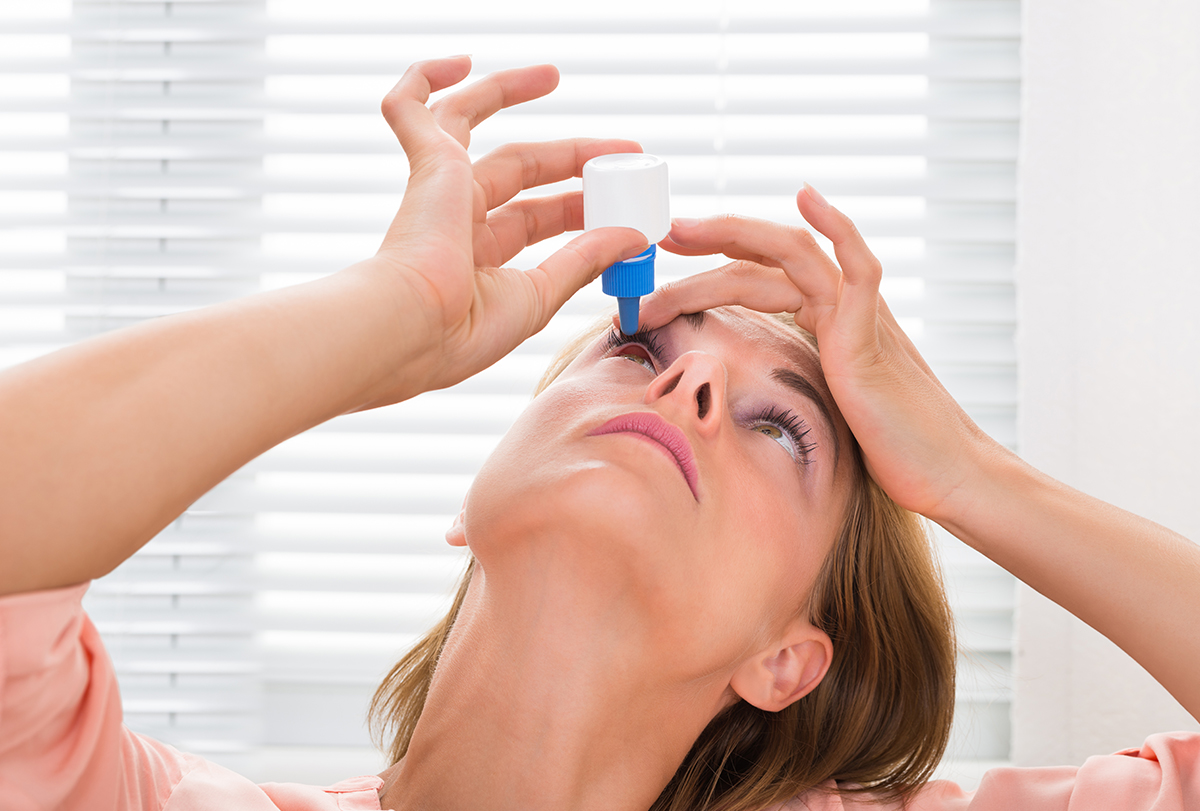
Tears are an essential component required to maintain ocular health. It nurtures the surface of the eye, keeps it lubricated, and wipes away foreign particles including dirt and infections. These tears are a combined complex of secretions from the glands present in the eyelids.
Upon secretion, the tears are spread over the entire cornea, the transparent front layer of the eyes. The even distribution of tears is ensured by the frequent blinking of the eyelids, while the excess tears are channeled towards the small ducts lying in the inner corners of the eye and are drained behind the nose.
An imbalance in the production and drainage of the remaining tears can cause dryness in your eyes. A very common illness among adults, dry eyes are more prevalent in women and older adults.
How Do Tears Function?
Tears are produced by the lacrimal gland. Human tears are composed of water, mucus, oil, proteins, vitamins, and electrolytes. These components add to the functional attributes of tears. Blinking helps spread the tears over the surface of your eyelids.
A typical tear film has an outer oily layer of lipids, a middle aqueous layer, and an inner layer of mucus.
- The outer oily layer prevents the evaporation of tears and smoothens its surface. The oil is secreted by the Meibomian glands.
- The middle watery layer is what you see most of the time trickling down the eyes. This helps keep the eyes clean and wipe away foreign particles. This layer is contributed by the lacrimal glands present in the eyelids.
- The inner mucus layer allows the tears to stick to the eyes. It also helps spread the aqueous layer evenly over the surface of the eyes by retaining moisture. This layer is secreted by the conjunctiva, a tissue encompassing the inner eyelid surface and the white portion of the eyes.
Tips to Reduce Dry Eyes
You can tend to the dryness in your eyes by instilling some changes in your lifestyle, adopting clean hygienic habits, and following natural strategies.
1. Lifestyle changes
Implementing changes in your routine activities and environment can help alleviate the adverse effects of your lifestyle on your eyes. These include the following: (1)
- Limit screen time to a minimum. Avoid extreme use of computers, television, and mobile phones for long time periods. Desktop office work is one of the culprits behind “computer vision syndrome,” an illness similar to dry eyes. Take short breaks in between your work or studies to rest your eyes. Make sure to keep blinking while doing these activities.
- Wear sunglasses at all times when going out in dry environments, hot, windy weather conditions, and high altitudes.
- Avoid going out in places with heightened levels of pollution, dust, chemicals, smoke, and smog. (2)
- Adjust your schedule such that you sleep on time. Staying up for long hours at a stretch can give you dry eyes.
- Using a humidifier, especially in the winter months, can help prevent dry eyes. The central heating system in your home and office often dries the air out, which can aggravate dry eye symptoms. Hence, try using a humidifier to add some moisture back into the air. This, in turn, will provide moisture for your eyes.
- You can also add moisture to indoor air by placing plants in your room unless you are allergic. Some of the best plants for this purpose are the areca palm, peace lily, and Boston fern. These plants also help purify the air by absorbing indoor air pollutants.
2. Clean your eyelids frequently
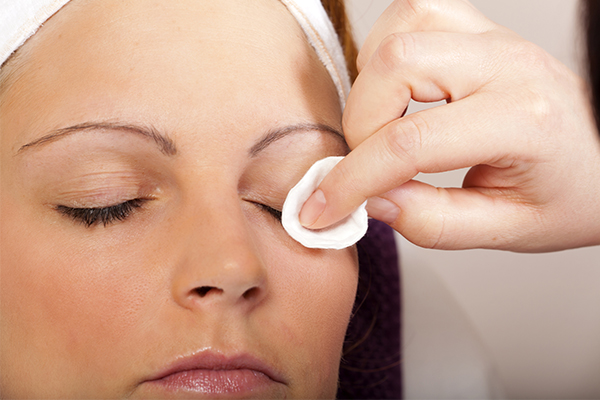
Practicing good hygiene can help keep your eyelids clean, produce tears, and reduce the associated discomfort. People with dry eyes tend to constantly rub their eyes, which should be avoided to reduce inflammation.
To relieve this discomfort and maintain proper eye hygiene, it is recommended that you wash your eyelids a few times a day. Eyelid clearing agents can be used by people wearing makeup to keep their eyes clean and moist and retain their health. (1)
You can use lid wipes and foam cleansers to keep your eyes clean. (3)
How to clean:
- Put a few drops of baby shampoo on your clean fingertips.
- With your eyes closed, gently massage your eyelids near the base of your eyelashes.
- Rinse the soap completely from your eyelids using lukewarm water.
- Do this once or twice a day.
3. Blink more often
Blinking regularly encourages the spread of tears over the eyelid and helps keep the eyes moist. Blinking more often also promotes blood circulation to the eyes and reduces eyestrain. In fact, each blink brings nutrients to the eyes’ surface structures and helps maintain its health.
Perform this blinking exercise:
- Close your eyes fully and count to 2.
- Then, squeeze the eyelids together and again count to 2.
- Finally, open your eyes and count to 2.
- Do this exercise every hour for 5 times, for a few weeks.
4. Apply a warm compress
A very comfortable way of dealing with dry eyes is using a warm compress. The heat from the compress increases blood circulation to the area and promotes the formation of tears.
A warm compress will also soothe eye irritation and provide relief from the symptoms. A study found that the use of hot towels and eye masks could help manage the symptoms of dry eyes. (1)
Another study supported the use of eye warmer masks to lessen the symptoms of dry eyes. The warming mask is applied to the eyelids twice a day for 10 minutes for a span of 2 weeks. (4)
How to use:
- Soak a clean, lint-free cloth in hot water and wring out the excess water.
- Hold this warm, moist cloth over your closed eyelids for up to 10 minutes at a time (not more than that). Be sure to rewet the cloth with warm water when it cools.
- Finally, give your eyes a nice rinse with lukewarm water.
- Use this treatment at least twice daily until your symptoms subside.
Use an eye mask that is made of gel that can be heated in the microwave. Ensure that it is not too hot before application.
Note: When using a compress for your eyes, make sure the temperature does not exceed 108°F.
5. Use eye drops containing castor oil
Castor oil also helps reduce the symptoms of dry eyes. The ricinoleic acid in the oil works as an anti-inflammatory agent that helps relieve the itching, irritation, burning, and pain associated with the condition. The oil can also help reduce tear evaporation.
A study has cited the use of castor oil eye drops to treat Meibomian gland dysfunction as a result of reduced evaporation of tears. (5)
Another study supports the use of Refresh Endura (castor oil with 1% glycerin and 1% polysorbate 80) in restructuring the lipid tear film in patients with dry eyes. (6)
To use castor oil to treat dry eyes:
- Buy pure, organic, hexane-free castor oil.
- Using an eye dropper, place one drop of it in each eye.
- Repeat twice daily to keep your eyes moisturized and to reduce redness.
6. Enrich your diet with omega-3s
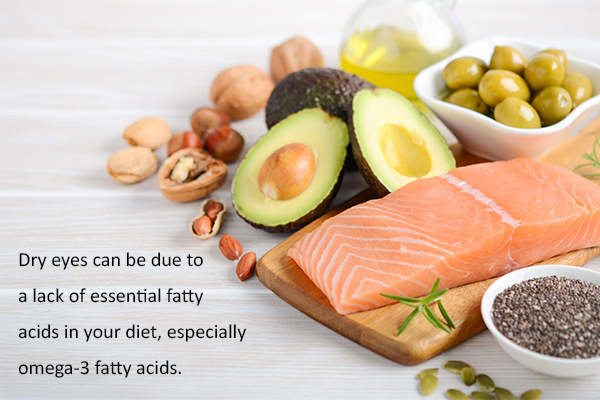
Dry eyes can be due to a lack of essential fatty acids in your diet, especially omega-3 fatty acids. Omega-3s help reduce inflammation in the body and also stimulate tear production and high-quality tears.
According to a 2014 study published in Clinical Ophthalmology, supplementing your diet with omega-3 fatty acids and antioxidants can reduce the symptoms of dry eyes. (7)
Also, these fatty acids are essentially important for your ocular health.
How to consume:
- Eat more omega-3 fatty acid sources to treat dry eyes.
- Include foods rich in omega-3 fatty acids in your diet. These include fatty fishes, fish oils, sesame seeds, almonds, flaxseed, flaxseed oil, chia seeds, and walnuts.
- You can also take omega-3 supplements, after consulting your doctor.
Anecdotal Remedy
The following remedy is neither backed by scientific evidence nor reviewed by our health experts. Nonetheless, a number of general users have reported an improvement in their condition using it.
Rose water
Rose water is another very effective remedy for dry eyes. It works as a natural relaxer for strained and tired eyes which can lead to poor formation of tears. Plus, rose water houses vitamin A, the vitamin that in low amounts can cause dry eyes.
How to use:
- Rinse your eyes with rose water.
- You may also dip a piece of cotton cloth or a cotton ball in rose water and apply it on your closed eyelids. Leave it on for about 10 minutes. Repeat two to three times a day.
- Another option is to place sterile pads dipped in rose water on your closed eyelids for about 10 minutes. Do this two to three times a day.
What Can Cause Dry Eyes?
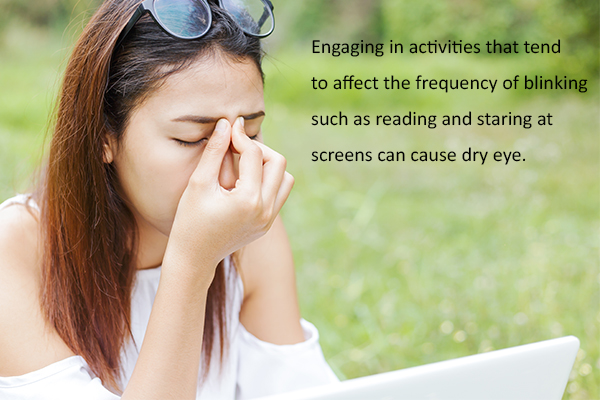
Usually, dry eyes are caused by a lack of adequate tears – not tears for crying, but the tears produced by the tear glands to keep the surface of your eyes smooth and clear as well as to help protect your eyes from infection.
Dry eyes can be caused by both medical and environmental factors. These factors include:
- Meibomian gland dysfunction
- Skin diseases in and around the eye
- Engaging in activities that tend to affect the frequency of blinking such as reading and staring at screens
- Pregnancy
- Side effects of certain medications that include nasal decongestants, blood pressure medications, contraceptive pills, antidepressants, and tranquilizers among others
- Blepharitis, an eye disease which causes the eyelids to turn red and swollen, almost the same as the meibomian gland dysfunction
- Exposure to adverse climatic conditions such as excessive smoke, wind, or dryness
- Entropian, a condition where the eyelids tend to turn inside, and ectropion, the reverse condition of an outward turning of the eyelids
- Eating a diet low in vitamin A and omega-3 fatty acids
Signs That Your Eyes Might Be Dry
Some of the common symptoms that appear when your eyes are dry include:
- Redness in the eyes
- Eye fatigue
- Sensitivity to light
- Poor night vision
- Sticking together of eyelids when waking up
- A sensation of having something in the eyes (especially when wearing contact lenses)
- Difficulty in driving at night
- Stinging, itching, and a gritty sensation in eyes
- Blurry vision that resolves after blinking
- Difficulty in reading or staring at screens
Treatment for Dry Eyes
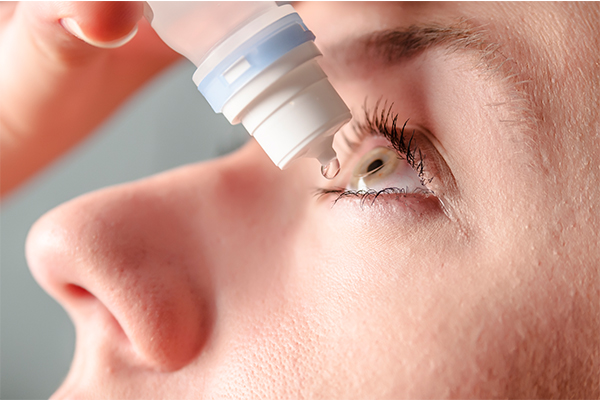
Once your doctor has identified the cause of your discomfort as dry eyes, he is likely to prescribe the following:
- Lubricants: Lubricants can help if your eyes are not producing the required amount of tears. These are available as drops, ointments, or gels and can be availed from a local pharmacy store.
- Eyelid cleaning: Because dry eyes can be a result of poor eyelid hygiene causing inflammation in the oil glands, it is recommended that you keep your eyes clean, apply a warm compress, or clean your eyelids using a mixture of baby shampoo and water.
Aside from these, your ophthalmologist will recommend the following to give your dry eyes a rest so that they can heal on time:
- Blink your eyes frequently and consciously while using digital devices, laptops, computers, or mobile phones. This will help spread the tears over the eyelids.
- Give your eyes a break every 20 minutes while working on a screen, reading, or doing similar activities. Focus on a point at a distance of about 20 feet for about 20 seconds.
Diagnosing Dry Eyes
Your doctor will diagnose your case further by taking a close look at your eyes using a slit lamp. He will look for inflammation in your eyelids and any signs of a plugged Meibomian gland and examine the health of the tears being produced. He will check for signs and symptoms of a dry eye.
Your doctor will inquire about your medical history. This includes your present medical conditions, weather condition you’ve lately been in, diseases you might be suffering from, any medications you are on, and your exposure to pollution, dust, or smoke to ascertain if your dry eyes have been caused by any of these to avoid any future consequences.
He may also analyze the rate of tear production in your eyes using filter paper strips. Once the diagnosis is affirmed, he will treat you in accordance with the underlying cause.
Tips to Prevent Dry Eyes
Following the below-mentioned tips can help combat the dryness in your eyes and promote eye health in the long run:
- Frequent reading and TV watching can dry out your eyes, so it is important to take breaks to regain the lost moisture.
- Avoid blowing air directly into your eyes when using hair dryers, car heaters, air conditioners, or fans.
- Avoid dry environments and high temperatures both indoors and outdoors, as dry air can irritate your eyes.
- Quit smoking and avoid exposure to secondhand smoke.
- Try to stay indoors when it is windy.
- Wear quality sunglasses that block 100% of the sun’s ultraviolet (UV) rays and the drying effect of winds.
- As coffee is acidic, excessive intake can intensify dry eyes in many cases. So, limit your coffee consumption.
- Acidic foods can aggravate dry eye symptoms, so avoid such foods until your symptoms are gone completely.
Who’s Likely to Get Dry Eyes?
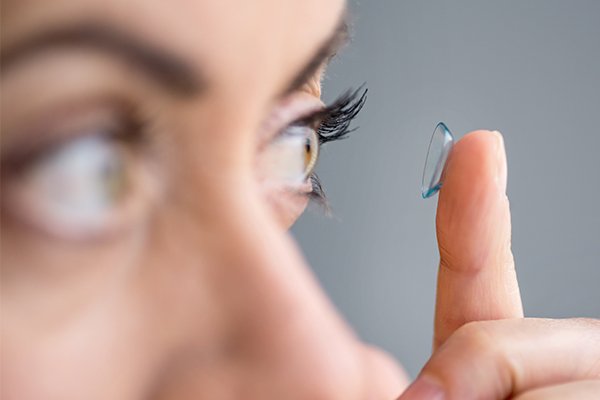
Certain risk factors can increase your chance of having dry eyes. These include:
- Being older than 65 (loss of function in the tear glands)
- Being a woman (due to hormonal changes), especially after menopause.
- Having chronic allergies
- Sleeping with your eyes partially open.
- Wearing contact lenses.
- Cosmetic surgery, due to the eyelids being opened wide excessively.
- LASIK (laser-assisted in situ keratomileusis) surgery where dry eyes last for about 3–4 months and may persist for longer durations of time.
- Diseases such as rheumatoid arthritis, lupus, and Sjögren’s syndrome.
Additional Tips to Manage Dry Eyes
- If you have an eyelid condition such as blepharitis and Meibomian gland dysfunction, get it treated to heal your dry eyes.
- Discontinue or reduce your use of contact lenses if it is associated with dryness in your eyes.
- You can also consider acupuncture therapy to deal with dry eye symptoms.
- If your eyes are dry, avoid wearing makeup, especially eyeliner and mascara, which can act as an irritant.
When to See a Doctor
Consult an ophthalmologist if the symptoms persist for a week. Seek medical attention to avoid any complications that may entail a risk of infections, conjunctivitis, corneal abrasion, and ulceration.
Final Word
Our eyes endow us with visual acuity and act as our gateway to the outside world. Thus, it is imperative to keep them in sound health at all times. It is also paramount to get a medical review for even the slightest discomfort in the eyes.
Dry eyes are a common problem but with no surefire cure. However, with proper hygiene and care, the symptoms can be kept in check. Also, it is crucial to fend off any eye problems by following preventive measures, making changes in your way of life, and keeping your eyes clean.
- Was this article helpful?
- YES, THANKS!NOT REALLY


